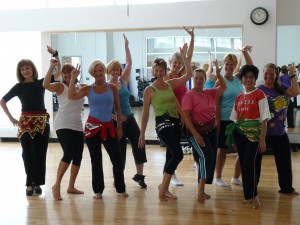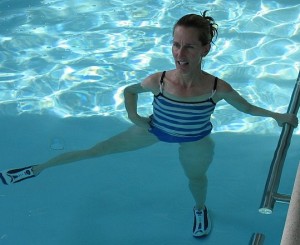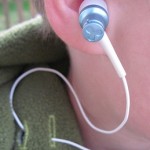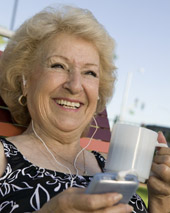by Michelle Sutton-Kerchner
Get up so you don’t always have to speak up. Exercise improves hearing. Along with countless other ways exercise keeps one young, proof now shows it helps hearing health …
Once considered inevitable, increased age is not an automatic sentence for lost hearing. Baby boomers, that means you, too.
Hear Like You’re Age 30 Again
And, if you’re only 30 years old, preserve your hearing ability for life.
Adults who remain active, specifically through cardiovascular exercise, can maintain hearing function well into old age. Genetic and environmental risk factors aside, fit seniors can improve their hearing to resemble that of younger generations. One in three Americans over age 65 suffers significant hearing loss. Yet, it is possible to beat the odds:
- Wear ear protection when exposed to loud noise, particularly when habitually exposed to noise pollution at work.
- Try to avoid medications that effect hearing sensitivity. And now …
- Keep fit!
Cardiovascular Health and Hearing
The benefits of physical activity are often obvious– a toned body, lower cholesterol and blood pressure, and improved mental outlook can be seen and felt. Research proves they can be heard, as well.
A healthy cardiovascular system improves inner-ear functioning. Improved circulation of blood and oxygen protects bones and muscles of the inner ear. Nutrients are delivered in the form of antioxidants, vitamins, and proteins that nourish the ear, just as they do the rest of the body.

Researchers believe cardiovascular fitness contributes to better neural integrity in the cochlea, the auditory portion of the inner ear. A good cardio workout ensures ample supplies of oxygen-rich blood are delivered. There is also decreased likelihood of the physically fit, heart-healthy to suffer auditory damage from noise pollution, certain medications, and disease. It can be assumed one who is fit is often healthier overall.
Improved blood flow to the brain also aids in hearing. Allowing for “fast thinking,” a brain on exercise can better sort and identify the sounds we hear. It is not simply the ability to hear better but to better process what is heard. Sound vibrations travel to the auditory portion of the brain where they are identified, along with their sources and meaning. Quick processing translates to quicker reaction time, which can have a huge impact on everything from driving a car to playing a game with grandkids.
Studies confirm improved aerobic fitness boosts cognitive processing speed, motor function, and visual and auditory attention in healthy older adults. Much of what we “hear” happens when our brains translate sound waves into meaning. This is called auditory processing. (Maybe selective hearing isn’t limited to married couples.)
A sedentary lifestyle can deprive the brain of needed oxygen. The ear itself may be healthy and function at full capacity. However, a brain that lacks healthy fuel can affect attention to incoming sounds and the ability to interpret them. A brain that receives inferior blood, tainted with excessive cholesterol, triglycerides, and sugar, is at a disadvantage in multiple areas, including hearing sensitivity. Hence, the powerful– and unexpected– connection between heart (cardiovascular) health and hearing.
The lead author in a study performed by the American Speech-Language-Hearing Association advises, “The older a person is, the more important it is to maintain or increase aerobic fitness, which is directly related to increasing cardiovascular health. This will positively affect many well-known health risk factors, as well as hearing sensitivity.”

Focus on engaging large muscle groups in aerobic activity for approximately 30 minutes, five days a week. The golden standard. Increasing physical activity in any capacity helps though, even if only a farther walk in the parking lot. A simple increase to a moderate fitness level is beneficial in maintaining the hearing levels of younger years. Try swimming, if joints are bothering you (and for a refreshing change, if they are not). Where’s the motivation to improve hearing if all you chat about are aching knees.
Let the Music Play, with Limitations

Portable audio devices are tiny and getting smaller. Earphones have shrunk to buds that directly insert in the ear. On-the-go listening never has been more convenient. As a result, people (especially teens and young adults) are grooving without limitations. Cool, yes. Risky, possibly. Depending on duration of use and volume, this “noise” can cause damage to the delicate hair cells in the inner ear, which transform sound waves to electrical signals the brain receives for auditory processing.
Follow safety guidelines when listening to earbuds (in-ear headphones). Listen for a maximum of 1.5 hours per day at 80 percent volume or less. You can safely increase to approximately 4.5 hours per day, if you decrease to 70 percent volume or less. Balance a safe volume level with a safe duration. Softer, of course, is better. The risk of permanent hearing loss can increase with just five minutes of exposure a day at full volume.
Hear This and Hear It Well
Much of what previously was blamed on aging—blaring TVs, a kink here, a stiff joint there—is now being recognized as a result of misuse of the body. Trends toward healthier lifestyles filled with physical activity combine with advances in medicine and scientific research. The outcome indicates advanced age, although often the excuse, is not itself the cause for decline of health.
You don’t have to feel, hear, or even look a certain way because of the year on your birth certificate. Condition your body and travel in the direction of wellness throughout life, including during senior years. Then, enjoy “youth” for longer; after all, it has no official age range. Baby boomers know it and flood the fitness scene as proof.
The more we learn, the more we realize age truly is just a number. Heart disease, diabetes, high blood pressure, osteoporosis, arthritis, and hearing loss– all of these often were assumed as part of the aging process. It was almost an expected natural progression. We know better now. Research proves being physically active into senior years improves health and increases the opportunity for an active lifestyle at any age.

Although the elderly traditionally may suffer hearing insensitivity, their wisdom often makes them the best listeners. Perhaps we should better hear what they have to share. So often, society turns a hurried deaf ear. What seniors may provide in a simple chat likely wasn’t discovered in a lab, tweeted on the Internet, or texted on a mobile device. Yet, it may be just the anecdote we need to grow, learn, and better understand.
Perhaps we should practice better use of our ears early on to hear more clearly throughout life. This skill, combined with that consistent cardio routine, can help preserve lifelong hearing sensitivity.
Sources
“Exercise Promotes Hearing Health,” by Helaine Alessio and Kathleen Hutchinson at www.hearingreview.com.
“How Exercise Can Help Your Ears,” by Erica Patino at www.everydayhealth.com.
“iPod Safety: Preventing Hearing Loss in Teens,” by Alice Park at www.time.com.
Image Credits
Senior with MP3 player (introductory photo): http://www.flickr.com/photos/67835627@N05/7301110748/
Earbud hoodie: http://www.flickr.com/photos/kellyhogaboom/6154329624/
Earth’s music: www.activehappiness.com.
 Fitness & Wellness News Your Source for Fitness News, Wellness News, Health News, and Nutrition News!
Fitness & Wellness News Your Source for Fitness News, Wellness News, Health News, and Nutrition News!




